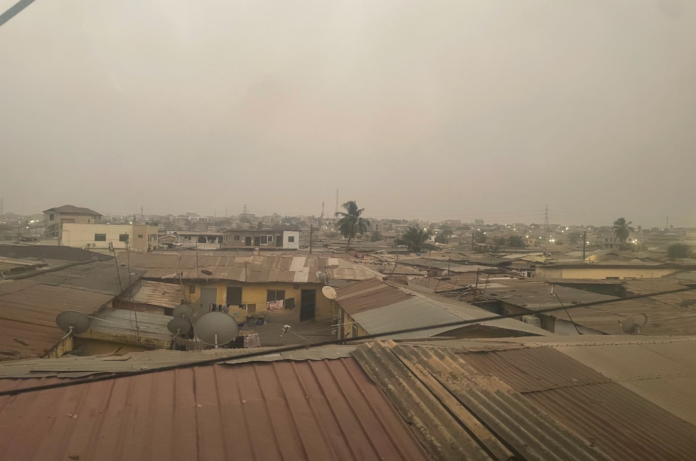
Severe, dry winds during the harmattan season are not new in Ghana. But experts with the country’s environmental agency say climate change is intensifying these weather conditions, leading to increased respiratory problems and poor air quality in Accra, the country’s capital.
When dispatch rider Efo Pascal recently returned to Accra from one of his delivery rounds, he came back with a dusty black sweater and helmet.
“Since the whole of last week and this week, the dust is too much and it is really bad. This is my first delivery today yet see how dirty I look,” he said.
Ghana is in the grip of the harmattan season, characterized by dry, dusty winds between the end of November through March, when winds from the Sahara desert reach West Africa.
Since December, the skyline in Accra has been hazy with excessive dust flying in the air.
In the past week, Accra’s air quality has been labeled hazardous by the Ghana Meteorological Agency, the Environmental Protection Agency and other air quality monitoring platforms. And even though the harmattan season is not new to Ghana, climate change is intensifying these harsh weather conditions.
Pascal said that driving at night has become dangerous due to visibility problems. And his health, too, is taking a hit. He said he’s already been to the hospital twice in the past two weeks due to breathing problems.
“Breathing was really hard for me, especially at night. I had pains in my chest and I was coughing,” he said as he pulled medicine out of his pocket. “The doctor said I had some infections from the air. That’s why they gave me antibiotics,” he said.
Yet he still struggles with his breathing.
Last August, a team of scientists published new research indicating a substantial correlation between air pollution and antibiotic resistance, resulting in about 480,000 premature deaths in 2018.
Pascal said he fears his health may deteriorate.
And he’s not the only one.
Patience Denu, a teacher at the Fountain Basic School in Accra, said the current dry weather is making some children sick. Inside the school courtyard, children usually run around or chat with friends during recess — but the weather is taking a toll.
“Their faces, all dry, their lips are breaking and all that. Because of that, they are always like, ‘My head…I’m feeling tired…’ They [the children] are always complaining of headaches,” she said.
Denu said the situation is making schoolwork tedious. When the children don’t feel well, she said the children have to spend a few days at home. The school may shut down if the situation does not improve, she added.
Emmanuel Osei Waziri, who recently dropped off his children at school, said he’s worried.
“The dust is everywhere, and it’s hard to shield them from it. How do I even tell if it is not already affecting their lungs? We are still monitoring whether we may have to keep them at home for some time until the air becomes normal,” he said.
Surge in respiratory illnesses
Some hospitals are now seeing a surge in respiratory tract infections among children.
At the Child Health Emergency unit of the Korle Bu Teaching Hospital in Accra, Mabel Okine said her 2-year-old has been coughing excessively and having breathing difficulties in the last two weeks.
“This is the third time I am bringing her to the hospital. We have tried prescriptions and even home remedies but she is still not getting better. I sell water by the road and usually strap her on my back. So I think the air has entered her system,” she said.
Paediatrician Dr. Frank Owusu Sekeyere said they are recording 30 respiratory tract infection cases per day compared to just six cases every two months before the harmattan season started.
“So, the children are coming in with either a runny nose or they are snorty, coryza [acute mucous] and then, they are also coughing. And then sometimes, they also come with signs of respiratory tract infections. What we also see is that fine particles in the air are worsening preexisting conditions. The situation is quite disturbing,” he said.
‘Health effects of climate change are very real’
Accra now sits alongside Delhi, in India, as one of the most highly polluted cities in the world. The fastest-growing African city of 4 million people sees a daily influx of 2.5 million business commuters. And the city is already grappling with the effects of climate change due to rapid urbanization and industrialization.
Selina Amoah, head of environmental quality at the EPA, said this year’s harmattan season is worse than years prior.
“From our monitoring locations along the roadside, we realized that the pollution levels are high — and this is largely due to climate change. Rising temperatures, changing wind patterns, and increased desertification have all contributed to the severity of the weather,” she said.
The expansion of desert areas has led to an increase in dust that is then carried by the harmattan winds.
Amoah said climate change can influence the intensity and duration of the harmattan season, potentially leading to more severe dust storms or altered patterns of dust transport. This can also have a detrimental impact on air quality.
“The only thing we can do now is to take precautions to stay safe,” Amoah said. They are encouraging people to stay indoors and wear a mask if they must go outdoors. They are also asking the public to refrain from burning garbage outside, and to use water to douse their surroundings in dusty areas.
Dirty air results in 4 million deaths annually around the world. In Ghana, this translates to at least 28,000 premature deaths every year. Yet, just 1% of global development aid is spent on tackling air pollution.
Akosua Kwakye, with the World Health Organization office in Ghana, said that air pollutants and greenhouse gasses often come from the same sources — coal-fired power plants and diesel-fueled vehicles.
“What we are experiencing in Ghana shows that the health effects of climate change are very real. There’s evidence to indicate that issues like respiratory infections, cardiovascular diseases and even some cancers are attributable to the events of climate change,” she said.
In 2022, the World Bank disclosed that global health-related damages linked to outdoor air pollution reached $8.1 trillion, equivalent to approximately 6.1% of the global gross domestic product. And the burden disproportionately affects low- and middle-income countries like Ghana.
Experts like Kwakye say that Ghana should begin to embrace green initiatives to include cleaner, renewable energy sources, phase out subsidies that promote use of polluting fuels, and plant more trees.
But Emmanuel Appoh, an environmental scientist at the University of Ghana who inspects sensors at an Air Quality Evaluation facility, said the latest data shows no signs of improvement any time soon.
“The current state of air quality is very unhealthy, and you have a lot of dust in the atmosphere. It is not encouraging at all. Hopefully this does not lead us into a public health crisis,” he said.
Source: Ghana/Starrfm.com.gh/103.5FM/Ridwan Karim Dini-Osman




